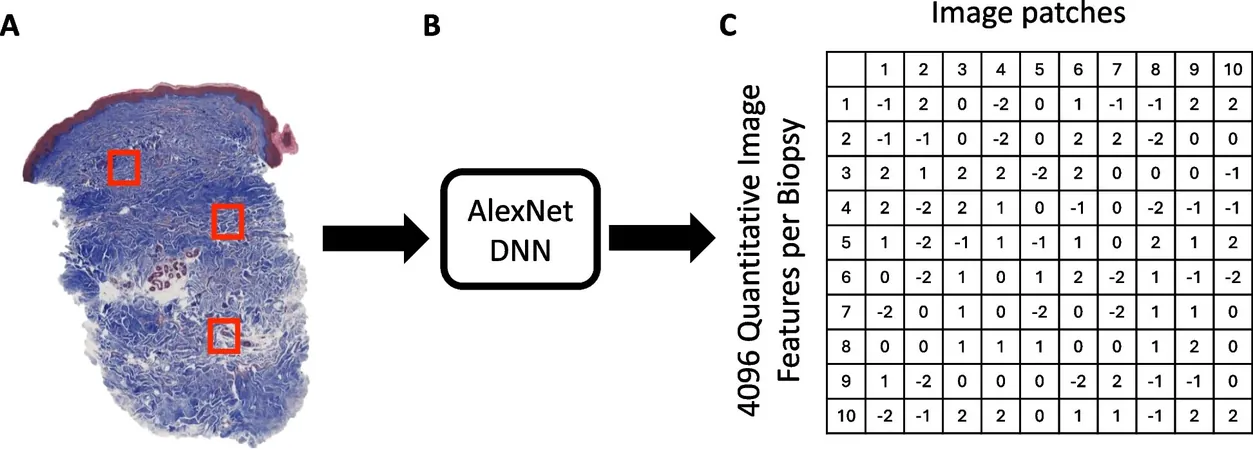
Revolutionary AI Technology Set to Transform Diagnosis and Treatment of Systemic Sclerosis
2025-05-05
Author: Mei
AI Takes Center Stage in Healthcare Innovation
Artificial intelligence (AI) is paving the way for a groundbreaking shift in healthcare, providing revolutionary tools for early disease detection and precise treatment monitoring. A recent Yale-led study, unveiled in Arthritis Research & Therapy, highlights the use of deep neural network (DNN) technology to decode skin involvement and treatment responses in patients battling systemic sclerosis.
Understanding Systemic Sclerosis: The Hidden Struggles
Systemic sclerosis, commonly known as scleroderma, is a debilitating autoimmune disorder marked by an overproduction of collagen—a protein crucial for maintaining tissue structure. This excessive collagen accumulation leads to the thickening and hardening of the skin, severely affecting the quality of life for those affected. "Patients face a unique double jeopardy: the disease can compromise their internal organs while also altering their physical appearance, which makes the impact of systemic sclerosis publicly visible," explains Dr. Monique Hinchcliff, the principal investigator of the study and an expert in rheumatology. "Identifying the disease sooner enables timely lifestyle adjustments and treatments before severe organ damage occurs, promoting longer and healthier lives."
The Limitations of Current Assessment Methods
Currently, the modified Rodnan skin score (mRSS) serves as the gold standard for assessing skin thickness in clinical trials for systemic sclerosis. While commonly utilized, this method has significant drawbacks, according to Ilayda Gunes, a research assistant in Dr. Hinchcliff's lab and lead author of the study. "The mRSS relies on a pinch test to measure dermal thickness and requires prolonged intervals to notice meaningful changes, often influenced by factors like obesity and swelling. Our study's purpose was not to replace the mRSS but to identify complementary methods that are more quantitative and reliable, potentially reducing the duration of lengthy clinical trials, which can span a year," Gunes says.
AI's Innovative Role in Fibrosis Scoring
In the study, researchers employed deep neural networks to analyze skin biopsies from patients with systemic sclerosis, generating a unique "fibrosis score" for each sample. This groundbreaking use of AI on SSc skin biopsies marks a first in medical research.
Initial Findings and Future Possibilities
The study aimed to compare the DNN-derived fibrosis score with the traditional mRSS in an SSc clinical trial and identify specific histological features detected by the DNN. The findings revealed a weak correlation between the two scoring methods, suggesting that AI may recognize skin characteristics that elude the pinch test. "The minimal correlation indicates that the DNN may be capturing skin elements beyond what clinicians can perceive through traditional methods," Gunes explains. Given that mRSS and fibrosis scores appear to identify distinct pathological features, combining both approaches could offer a more comprehensive understanding than relying on a single method.
Looking Ahead: Improving Clinical Trials and Patient Outcomes
The research team envisions that these discoveries will streamline clinical trials, enhance global recruitment strategies, and promote participant diversity, thereby amplifying the representativeness of SSc trial outcomes. Dr. Hinchcliff remains optimistic about the future of AI in healthcare, stating, "AI applications are evolving at a swift pace. We’re actively exploring new strategies that may assist in measuring the three critical components of systemic sclerosis skin disease: inflammation, vascular abnormalities, and fibrosis."




 Brasil (PT)
Brasil (PT)
 Canada (EN)
Canada (EN)
 Chile (ES)
Chile (ES)
 Česko (CS)
Česko (CS)
 대한민국 (KO)
대한민국 (KO)
 España (ES)
España (ES)
 France (FR)
France (FR)
 Hong Kong (EN)
Hong Kong (EN)
 Italia (IT)
Italia (IT)
 日本 (JA)
日本 (JA)
 Magyarország (HU)
Magyarország (HU)
 Norge (NO)
Norge (NO)
 Polska (PL)
Polska (PL)
 Schweiz (DE)
Schweiz (DE)
 Singapore (EN)
Singapore (EN)
 Sverige (SV)
Sverige (SV)
 Suomi (FI)
Suomi (FI)
 Türkiye (TR)
Türkiye (TR)
 الإمارات العربية المتحدة (AR)
الإمارات العربية المتحدة (AR)